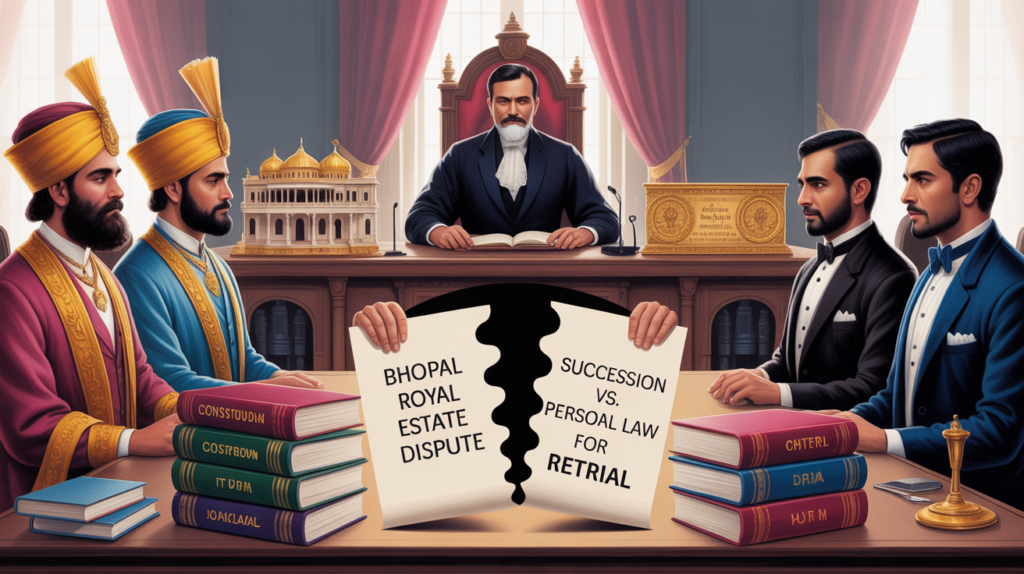Introduction
In a significant legal development, the Madhya Pradesh High Court has remanded a decades-old royal estate dispute back to the trial court for a fresh hearing. The case pertains to the private properties of the late Nawab Mohammad Hamidullah Khan, the last ruler of the erstwhile princely state of Bhopal. The court found that the earlier judgment passed by the trial court in 2000, which favoured the legal heirs of Begum Sajida Sultan, had relied on a precedent that was later overruled by the Supreme Court. Given the changed legal position, the High Court ordered a retrial and directed the lower court to expedite the proceedings.
Background: The Royal Lineage and Property Claims
Nawab Hamidullah Khan, who ruled the princely state of Bhopal, passed away in 1960. Following the merger of Bhopal with the Indian Union in 1949, a merger agreement was signed. This agreement granted the Nawab certain privileges and allowed succession to the gaddi (throne) under the Bhopal Succession to the Throne Act, 1947. After his death, his daughter, Sajida Sultan, was declared his successor and became the Ruler under the said agreement.
Actor Saif Ali Khan, grandson of Sajida Sultan and son of the late Mansoor Ali Khan Pataudi, inherited the Bhopal properties through her lineage. The trial court had upheld this line of succession, granting exclusive rights to Sajida Sultan’s heirs over the Nawab’s estate.
Legal Dispute: Partition vs. Primogeniture
The appellants in the case were other relatives of the late Nawab, including Begum Suraiya Rashid, Nawabzadi Qamar Taj Rabia Sultan, and their legal representatives. They filed suits seeking partition, possession, and settlement of the Nawab’s estate, asserting that the properties were personal in nature and should be distributed among all legal heirs in accordance with Muslim Personal Law of Succession.
On the contrary, the respondents — the legal heirs of Sajida Sultan, including actor Saif Ali Khan, actress Soha Ali Khan, and Sharmila Tagore — maintained that succession was governed by the principle of primogeniture, whereby the entire estate devolved upon the successor to the throne, as per the Bhopal Succession Act and the terms of the merger agreement.
Government of India’s Role and the 1962 Notification
A key point of contention was a 1962 letter from the Government of India, which declared Sajida Sultan the rightful heir to Nawab Hamidullah Khan’s personal estate under Article 366(22) of the Constitution. The appellants challenged the legal validity of this notification, asserting that personal law, and not the terms of the throne succession or merger agreement, should determine the inheritance.
Trial Court Ruling and its Legal Flaw
The trial court acknowledged that the appellants’ lawsuits were maintainable and within jurisdiction. However, it ruled against them, holding that Muslim Personal Law did not apply to the Nawab’s personal properties and dismissed the claim based on a 1997 judgment of the Allahabad High Court in Talat Fatima Hasan v. Nawab Syed Murtaza Ali Khan, which supported primogeniture in a similar context.
High Court Intervention and Grounds for Remand
Justice Sanjay Dwivedi of the Madhya Pradesh High Court noted that the trial court had erred in relying on a judgment that had been explicitly overruled by the Supreme Court in 2019. In Talat Fatima Hasan through Attorney v. Syed Murtaza Ali Khan, the apex court held that the personal law of succession applied to the inheritance of properties of erstwhile rulers.
Recognizing the significant shift in legal interpretation, the High Court invoked Order 14 Rule 23A of the Civil Procedure Code, which allows for remand when a retrial is necessary due to a reversal of the legal basis of the original judgment. It emphasized the importance of a fresh decision based on the current legal position and allowed for additional evidence to be presented if required.
Court Directions and Timelines
The High Court set aside the February 14, 2000 trial court judgment and directed the matter to be re-heard afresh. Given the prolonged nature of the case, which dates back to 1999, the bench urged the trial court to conclude proceedings within one year.
Justice Dwivedi clarified that, as these are suits for partition, the trial court must evaluate all relevant legal aspects, determine shares, and proceed to pass a preliminary decree if necessary, followed by appropriate partition formalities.
Conclusion
The ruling by the Madhya Pradesh High Court marks a pivotal moment in a protracted legal battle over royal inheritance. By remanding the case and recognising the primacy of personal law over princely succession agreements, the court has opened the door for a fair distribution of the Nawab’s estate among all eligible heirs. The fresh trial is now expected to resolve longstanding claims, aligning the outcome with constitutional principles and recent judicial precedents.
Case Information:
- Case Title: Begum Suraiya Rashid v. Begum Mehr Taj Nawab Sajida Sultan
- Case No.: First Appeal No. 296 of 2000
- Court: Madhya Pradesh High Court
- Bench: Justice Sanjay Dwivedi
- Judgment: Trial court order set aside; case remanded for retrial

